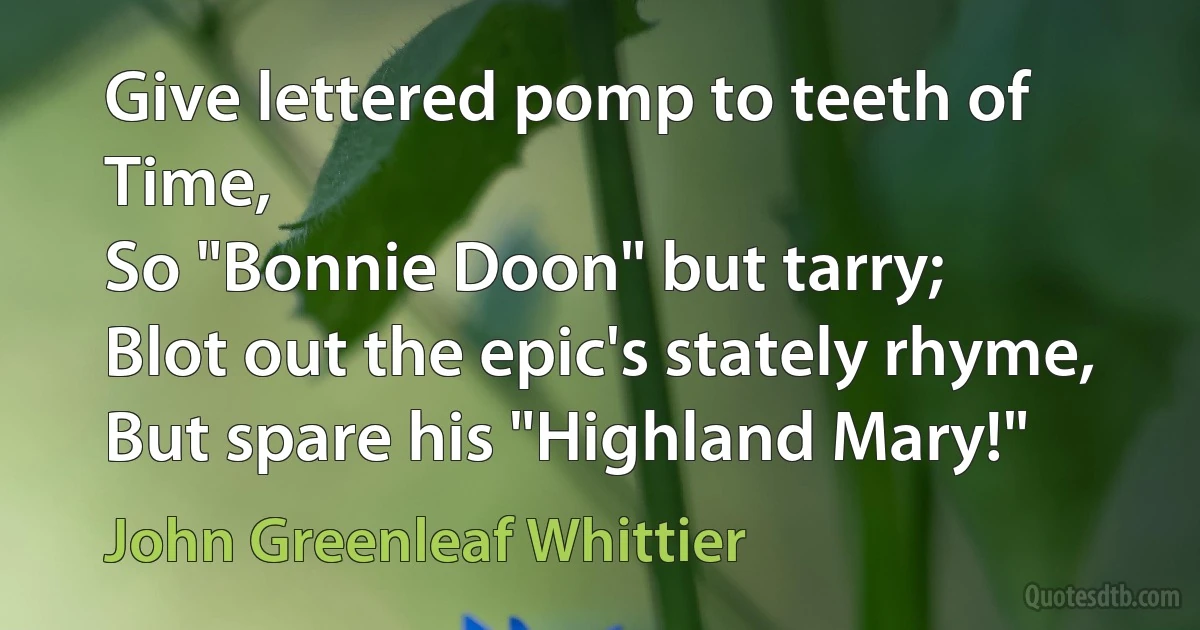Highland Quotes
Nudes -- stark and glistening,
Yelling in lurid glee. Grinning faces
And raging limbs
Whirl over the floor one fire.
For a shirt verminously busy
Yon soldier tore from his throat, with oaths
Godhead might shrink at, but not the lice.
And soon the shirt was aflare
Over the candle he'd lit while we lay.Then we all sprang up and stript
To hunt the verminous brood.
Soon like a demons' pantomine
The place was raging.
See the silhouettes agape,
See the glibbering shadows
Mixed with the battled arms on the wall.
See gargantuan hooked fingers
Pluck in supreme flesh
To smutch supreme littleness.
See the merry limbs in hot Highland fling
Because some wizard vermin
Charmed from the quiet this revel
When our ears were half lulled
By the dark music
Blown from Sleep's trumpet.

Isaac Rosenberg
Now I protest to thee, gentle reader, that I entirely dissent from Francisco de Ubeda in this matter, and hold it the most useful quality of my pen, that it can speedily change from grave to gay, and from description and dialogue to narrative and character. So that, if my quill display no other propertoies of its mothergoose than her mutability, truly I shall be well pleased; and I conceive that you, my worthy friend, will have no occasion for discontent. From the jargon, therefore, of the Highland gillies, I pass to the character of their Chief. It is an important examination, and therefore, like Dogberry, we must spare no wisdom.

Walter Scott
There is no European nation which, within the course of half a century, or little more, has undergone so complete a change as this kingdom of Scotland. The effects of the insurrection of the 1745 - the destruction of the patriarchal power of the Highland chiefs - the abolition of the heritable jurisdictions of the Lowland nobility and barons - the total eradication of the Jacobite party [...]. [...] This race has now almost entirely vanished from the land, and with it, doubtless, much absurd political prejudice - but also many living examples of singular ad disinterested attachment to the principles of loyalty which they received from their fathers, and of old Scottish faith, hospitality, worth, and honour. [...] for the purpose of preserving some idea of the ancient manners of which I have witnessed the almost total extinction, I have embodied in imaginary scenes [...].

Walter Scott
Trees which grow in places facing the course of the sun are not of porous fiber but are solid, being drained by the dryness... The trees in sunny neighborhoods, therefore, being solidified by the compact texture of their fiber, and not being porous from moisture, are very useful, so far as durability goes, when they are hewn into timber. The lowland firs, being conveyed from sunny places, are better than those highland firs, which are brought here from shady places.

Vitruvius
Americans are everywhere very decent, magnificent and ignorant. They are generous and lovable; they hog the earth and blight the land. In every hill and holler, highland, forest, meadow and plain they will continue to mingle and to learn, by intelligent transition or headlong catastrophe, to bind their lives to the resources of the land.

Paul Glover
1 Corinthians 6:9–10 lists homosexual behavior as a sin that will bring judgment by God on the unrighteous. The beautiful truth of Christ's gospel is found in verse 11, "And such were some of you. But you were washed, but you were sanctified, but you were justified in the name of the Lord Jesus and by the Spirit of our God.” Yes we should be welcoming of practicing homosexuals with the love of Christ, but with a clear presentation of His death for their sinful perversion of God-ordained sexuality between one man and one woman in Genesis 2:24. Anything less misses the meaning of what the love of God really is, not an inclusive message but a saving gospel (John 3:16). The church shouldn't encourage people who struggle with same-sex attraction to engage in sinful sexual practices. No, church leaders like those at Highland Baptist should be finding ways to share the gospel with unbelievers and encourage Christians to live in a way that's pleasing to God.

Ken Ham
I would I were a careless child,
Still dwelling in my Highland cave,
Or roaming through the dusky wild,
Or bounding o'er the dark blue wave;
The cumbrous pomp of Saxon pride,
Accords not with the freeborn soul,
Which loves the mountain's craggy side,
And seeks the rocks where billows roll.
Fortune! take back these cultur'd lands,
Take back this name of splendid sound!
I hate the touch of servile hands,
I hate the slaves that cringe around:
Place me among the rocks I love,
Which sound to Ocean's wildest roar;
I ask but this-again to rove
Through scenes my youth hath known before.
Fain would I fly the haunts of men-
I seek to shun, not hate mankind;
My breast requires the sullen glen,
Whose gloom may suit a darken'd mind.

Lord Byron
Wintons chronicle, I understand, is to be published early this winter. The editor is Mr. Macpherson, (not the Highland impostor); and I am assured that the utmost accuracy and integrity is to be manifested on the occasion: either of which, you know, is pretty extraordinary in a Scotchman. Indeed, I am apt to suspect the publishers abilities rather than his honesty: but he has got a very masterly assistant.

Joseph Ritson


